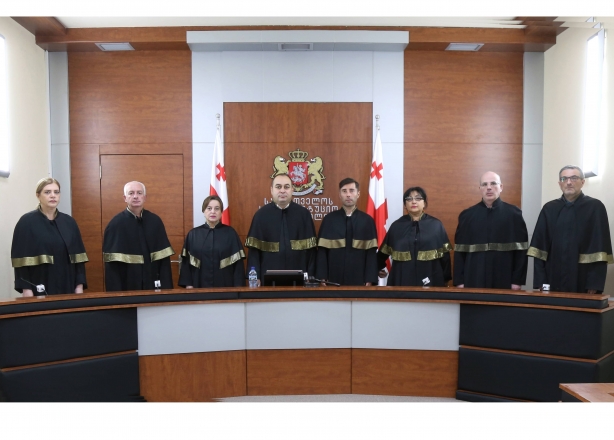News
Constitutional Court of Georgia did not uphold Constitutional Complaint №1620
On July 25, 2025, the Plenum of the Constitutional Court did not satisfy Constitutional Complaint №1620 (“Lasha Janashia and Paata Danelia v. Parliament of Georgia”).
The disputed provision regulates exceptional cases in which, by the decision of the High Council of Justice, a judge of the general courts may continue to exercise judicial powers until the completion of proceeding commenced with their participation. Specifically, in accordance to the aforementioned provision, if a judge reaches the mandatory retirement age or his/her tenure expires before the completion of the consideration of a case initiated by the latter, the High Council of Justice of Georgia may decide to extend the judge’s authority solely to reach a final decision in that case, either individually or as a part of the Judicial Panel or Chamber the judge being in the composition of which.
The plaintiff considered the normative content of disputed provision as unconstitutional - granting discretionary authority to the High Council of Justice to extend the powers of a Supreme Court judge, upon reaching the mandatory retirement age and/or upon expiration of the term of power, until a final decision is reached in relation to pending cases assigned to the judge despite of the fact that the termination of the judge’s authority does not pose a risk of failing to form a quorum in the Chamber of the Supreme Court or otherwise hinder the functioning of the Court. According to the plaintiff, granting such broad discretionary powers to the High Council of Justice creates the potential for institutional manipulation and undermines judicial independence during the extension period.
According to the defendant the legitimate aim of the disputed norm is to ensure prompt, timely, and effective administration of justice. As explained by the defendant, when deciding whether to extend a judge’s term of power, the objective of the High Council of Justice is to guarantee the efficient administration of justice and the completion of cases that were commenced with the participation of this judge. Meanwhile, the defendant emphasized that the extension of judicial term of power is temporary in nature and does not pose a risk to judicial independence. The Constitutional Court ruled that the Constitution of Georgia does not expressly prohibit the extension of a Supreme Court judge’s authority with the purpose of completing pending cases. According to Court’s assessment, such a mechanism is compatible with the Constitution and serves the goal of ensuring the effective administration of justice, including in cases where the termination of a judge’s authority does not result in the absence of a quorum or otherwise hinder the functioning of the Court. According to the Constitutional Court, the mechanism established with disputed norm facilitates the timely resolution of cases pending before the judge and, consequently, supports the prompt/timely and effective administration of justice.
At the same time, Constitutional Court determined that the extension of the term of power of a Supreme Court judge does not, in substance, prohibit appointment to judicial office or a reappointment to that position. Moreover, in each individual case, the extension of authority is not based solely on the objective circumstance that the judge must still adjudicate pending cases, it also takes into account factors, such as statistical analysis of the caseload within the Supreme Court, the workload of specific chambers, the number and complexity of cases assigned to individual judges, the realistic prospects for concluding those cases, and other relevant considerations. The constitutional body responsible for examining and evaluating all of these abovementioned circumstances is the High Council of Justice of Georgia. Accordingly, the decision-making authority granted to the High Council of Justice regarding the extension of a Supreme Court judge’s powers, was recognized as a logical and justified solution. Furthermore, the Constitutional Court held that entrusting this authority to the High Council of Justice significantly reduces the risk of direct or indirect political influence on judicial independence by the legislative and executive branches of the government.
In addition to this, the Constitutional Court ruled that the practical application of the disputed norm clearly indicated at the legitimate purpose of the mechanism and the temporary nature of the extension of judicial authority.
In view of the above-mentioned, Constitutional Complaint №1620 was not uphold.
The Subject Matter of the Dispute: The constitutionality of the first sentence of Paragraph 5 of Article 36 of the Organic Law of Georgia. On General Courts in relation to Paragraph 1 of Article 31 of the Constitution of Georgia.


